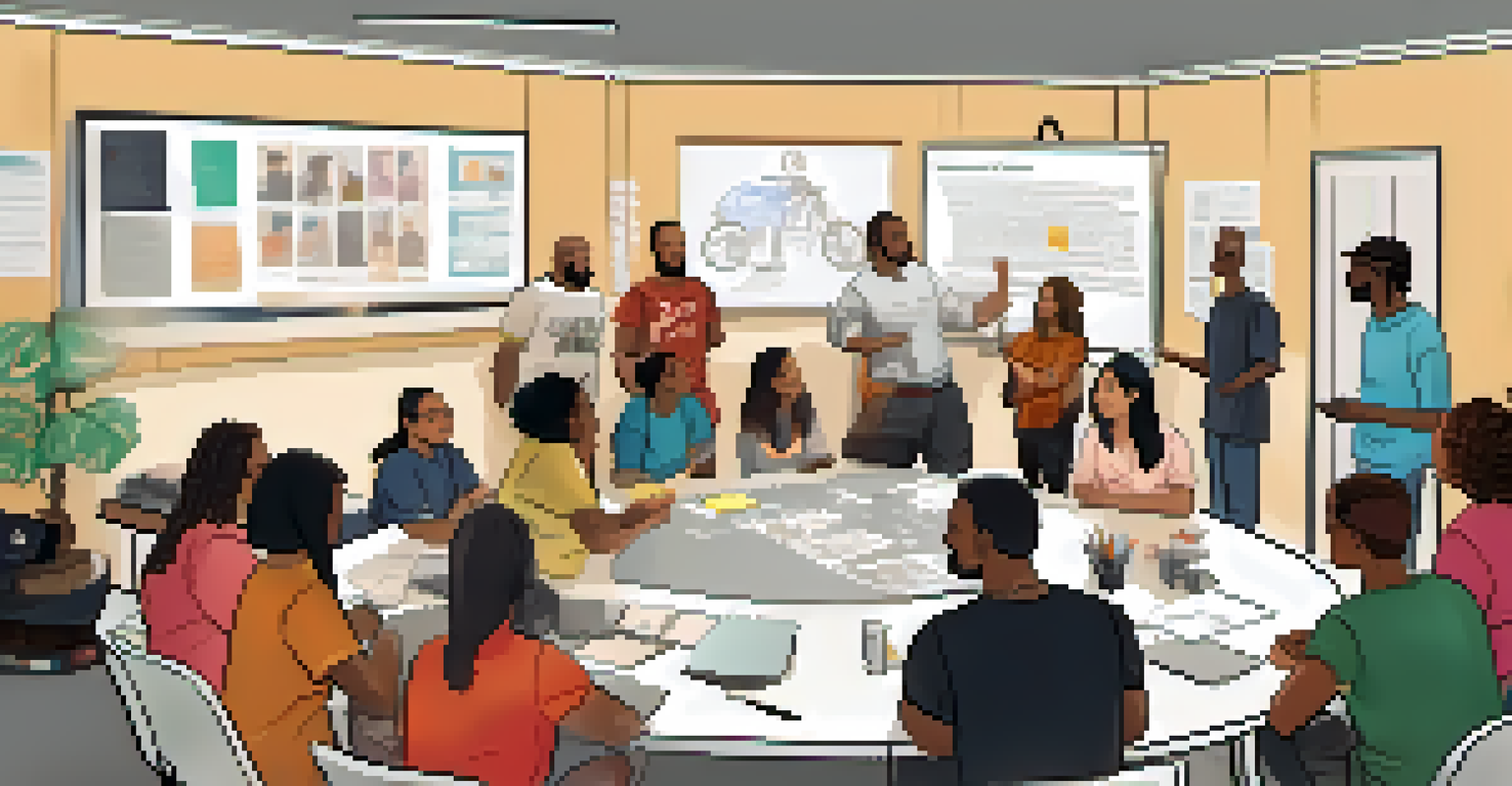Using Role-Playing as a CBT Technique for Social Skills

Understanding Role-Playing in Cognitive Behavioral Therapy
Role-playing is a powerful technique often used in cognitive behavioral therapy (CBT) to help individuals practice and develop social skills. By simulating real-life scenarios, clients can explore different ways to interact with others in a safe environment. This method encourages experimentation and can help reduce anxiety associated with social interactions.
The only way to make sense out of change is to plunge into it, move with it, and join the dance.
In CBT, role-playing helps individuals identify and challenge negative thought patterns that may hinder their social abilities. For instance, someone who feels nervous about speaking in public can practice giving a speech while receiving constructive feedback. This process not only builds confidence but also reinforces positive behaviors.
Ultimately, role-playing serves as a bridge between theory and practice, allowing clients to apply what they’ve learned in therapy to real-world situations. It encourages active participation and can lead to significant improvements in communication and interpersonal relations.
Benefits of Using Role-Playing for Social Skills Development
One of the most notable benefits of role-playing is its ability to provide immediate feedback. As clients act out different scenarios, therapists can offer suggestions and corrections in real-time, helping to refine social techniques. This dynamic interaction often leads to deeper understanding and retention of skills learned.

Additionally, role-playing can help reduce the fear of making mistakes in social situations. By practicing in a controlled setting, individuals can experiment with different responses without the pressure of judgment. This can be particularly beneficial for those who struggle with social anxiety, as it creates a low-stakes environment to build competence.
Role-Playing Enhances Social Skills
This technique allows individuals to practice real-life interactions in a safe setting, reducing anxiety and improving confidence.
Moreover, role-playing can enhance empathy and perspective-taking. When clients step into someone else's shoes, they gain insight into how their actions affect others. This understanding can lead to more compassionate interactions and improved relationships in everyday life.
Common Scenarios for Role-Playing in Social Skills Training
Role-playing can cover a wide range of social situations, from casual conversations to more complex interactions like conflict resolution. Common scenarios include practicing introductions, engaging in small talk, or navigating workplace dynamics. By simulating these situations, clients can feel more prepared and less overwhelmed when they encounter them in real life.
Mistakes should be examined, learned from, and discarded; not dwelled upon and stored.
Another useful scenario is role-playing difficult conversations, such as giving feedback or discussing boundaries. These conversations can be daunting, but practicing them allows individuals to formulate their thoughts and responses ahead of time. This preparation can significantly reduce anxiety and improve the likelihood of a positive outcome.
Finally, therapists may incorporate role-playing for group settings, such as team meetings or social gatherings. Clients can practice how to contribute to discussions or read social cues, making them feel more at ease in group dynamics. These skills are invaluable, especially in today's interconnected world.
Integrating Role-Playing with Other CBT Techniques
While role-playing is effective on its own, it can be even more powerful when integrated with other CBT techniques. For example, combining role-playing with cognitive restructuring allows clients to challenge negative thoughts while practicing their social skills. This holistic approach addresses both mindset and behavior, leading to more comprehensive growth.
Another effective combination is using role-playing alongside exposure therapy. Clients can confront their social fears gradually, starting with less intimidating scenarios and working their way up to more challenging interactions. This gradual exposure, paired with the skills developed through role-playing, can facilitate significant progress.
Immediate Feedback Boosts Learning
Therapists provide real-time corrections during role-playing, helping clients refine their social techniques and deepen their understanding.
Furthermore, journaling can complement role-playing by allowing clients to reflect on their experiences. After a role-playing session, writing about what went well or what could improve reinforces learning and helps solidify new skills. This reflection enhances the overall effectiveness of the training.
Setting Goals for Role-Playing Sessions
To maximize the benefits of role-playing in CBT, it's essential to set clear, achievable goals for each session. Goals might include improving eye contact during conversations or practicing assertiveness in group discussions. Having specific objectives provides direction and allows clients to measure their progress over time.
Additionally, discussing these goals with a therapist helps to ensure they are realistic and tailored to the individual’s needs. This collaboration fosters a sense of accountability and encourages clients to stay engaged in the process. As they achieve these goals, clients often feel a sense of accomplishment, further motivating them to continue practicing.
Lastly, regularly revisiting and adjusting goals as needed is crucial. As clients develop their social skills, their needs may change, requiring new challenges and objectives. This flexibility keeps the role-playing experience fresh and relevant, enhancing overall effectiveness.
Overcoming Challenges in Role-Playing
While role-playing can be incredibly beneficial, some clients may face challenges during sessions. Common obstacles include anxiety about performing or fear of judgment from peers. Addressing these feelings upfront can help clients feel more comfortable and open to the experience.
Creating a supportive environment is vital for overcoming these challenges. Therapists should emphasize that mistakes are a natural part of the learning process and encourage clients to view each role-play as an opportunity for growth. This reassurance can help ease apprehension and foster a more positive mindset.
Setting Goals Drives Progress
Establishing clear objectives for each role-playing session helps clients measure their improvements and stay motivated throughout their journey.
Additionally, starting with simpler scenarios can help clients gradually build confidence before tackling more complex interactions. This step-by-step approach allows individuals to acclimate to role-playing without feeling overwhelmed. With time and practice, clients often find their anxiety diminishes, paving the way for more effective learning.
Celebrating Progress and Continued Practice
As clients engage in role-playing and work on their social skills, celebrating their progress is essential. Acknowledging small victories, like successfully initiating a conversation or expressing their opinions, boosts motivation and encourages continued practice. Positive reinforcement helps clients recognize that they are making strides, even if the journey feels slow at times.
Encouraging ongoing practice outside of therapy sessions also plays a crucial role in skill development. Clients can be prompted to apply what they've learned in daily interactions, reinforcing their skills in real-world contexts. This consistent practice not only solidifies their learning but also helps build confidence over time.

Finally, it's important for clients to understand that improvement takes time and effort. Continuous encouragement to practice and reflect on their experiences will help them stay committed to their growth. With persistence and support, clients can enhance their social skills and navigate interactions with greater ease.